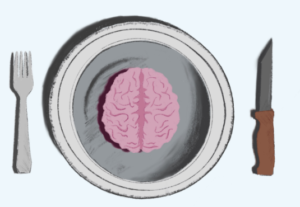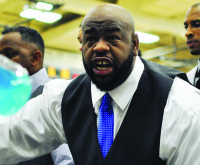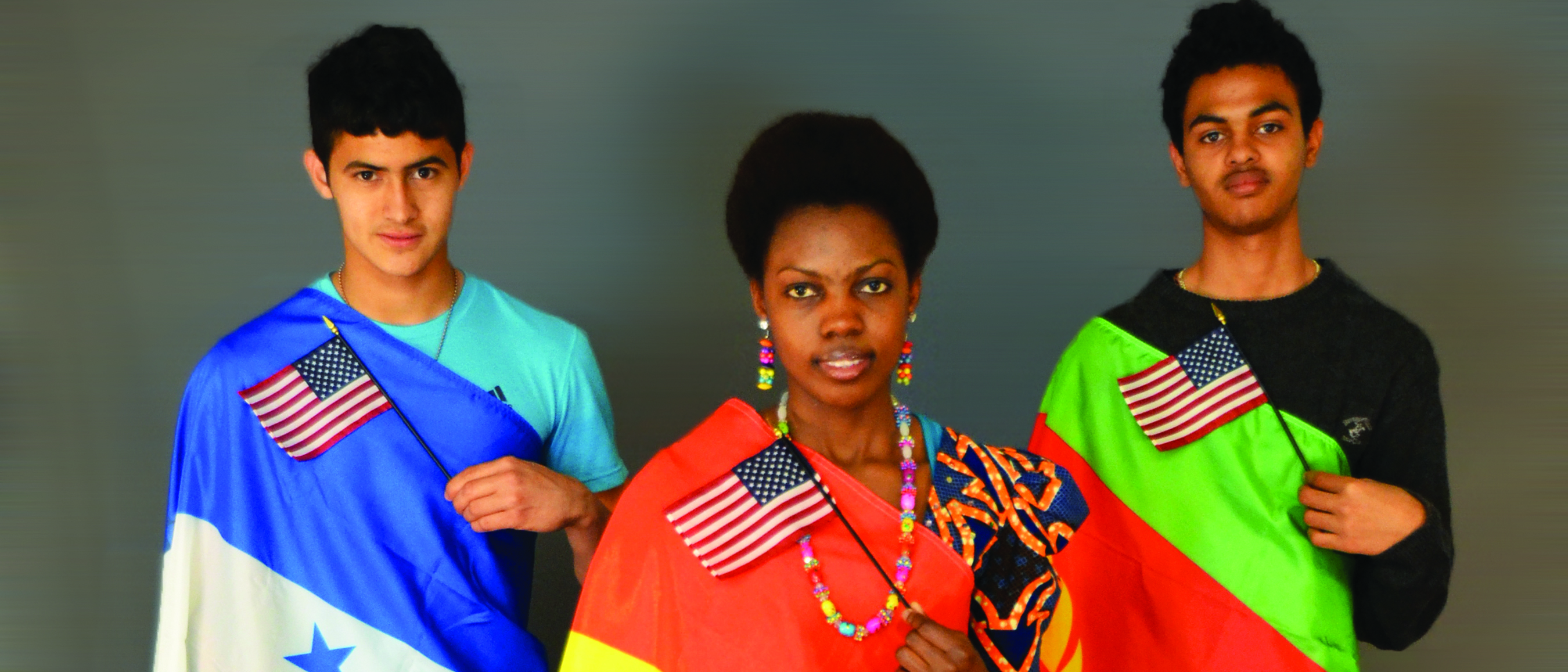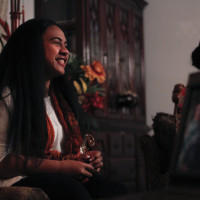
It was dinner time in the Jones’ household. Their dining room was ornately bland, with sparse art and a mahogany refectory table that took up most of the space. Mr. and Mrs. Jones sat on either end of the table. Their son, Simon, sat in between them.
In front of each member of the family sat a plate with a singular human brain. Simon never liked eating brains. In fact, he had recently stopped altogether. This upset his mother greatly.
Her voice rang against the porcelain, “Simon, we aren’t mad, we’re just disappointed.” His father nodded and looked back down at his food as if to encourage affirmation by passivity.
“You don’t care about eating your brains anymore. Do you even want to be smart?” Simon stared at the gelatinous human brain before him. His face reflected in the sinuous exterior, skin grayed by the dulled pink.
Eating brains was supposed to give people insight into the meaning of life, but Simon never felt enlightened after eating one.
It was a simple concept covered in most food pyramids: if you eat human brains, you are consuming a lifetime of human knowledge. With this knowledge, one is expected to understand the meaning of life. There were other foods in the pyramid, of course, but most were considered superfluous delicacies. On his birthday, Simon always ate a heart. He didn’t feel the intended effects of this either, but hearts did taste better than brains.
After dinner, Simon retired to his room. This was the only space where he felt true belonging. The decor was chaos to anybody but him; posters splattered the walls with unflinching color and paintings animated the ceilings. Simon’s tie-dye bed sheets and affinity for clutter seemed to send the room bubbling over with life. It was in this haven he had made, where Simon cursed the parts of him to which brains had no effect.
There was a hunger that festered in Simon. It wrapped its arms around his throat and instilled a fear for which he was incapable of naming. This scared him all the more.
Unable to sleep, he began to dream; realities danced behind his eyes. Realities that screeched to him their woes of individualism and estrangement. Realities that sang to him the beauty of belonging and love. They fed his hunger, filling him with an overpowering urge to run away.
To Simon, he had no place in this house if he could not relate to his family. Running away was never a finality — he would return when he could be what his parents wanted. Brains be damned, Simon was going to learn the meaning of life.
As he emptied his school bag with a fiery determination, Simon thought about where he would go. In the chaos of a desperate boy’s dream, a flier fell like an olive branch upon his lap. “The Academy Culinaria,” it read, a school less than 10 miles away filled with the most prestigious cooks and recipes the world has ever seen. That was where he would learn the meaning of life.
Simon began to re-pack his bag with all the supplies one might need on such a journey. He filled the pockets with grabbers and gizmos, making sure not to forget the essential doohickeys and whatnots. In the end, Simon departed with two bags and his bicycle.
Leaving a vague note on his bed, Simon climbed out his window and into the night. He wondered, like most children running away in the dead of night do, how hard his parents would look for him. And, like most children, he paradoxically hoped not too much and quite a lot.
Arriving at the Academy Culinaria left Simon flummoxed. How did one get inside such a prestigious school, much less convince its cooks to give him anything? He walked the carefully trimmed paths, anxiety growing. He approached a stern-looking man who was walking with resolve. “Excuse me, sir?” Simon said, meekly.The man looked down, lifting an elaborate eyebrow, “Yes? What is it, young man?”
Simon explained himself to the tall man, taking care to express the dire nature of his situation.
“I see,” noted the man. “Well, no time to waste then, I have plenty of leftovers in my fridge if you are interested in sampling some of the highest quality thoughts.”
“I would like that very much,” Simon replied. “Are you some kind of professor?”
“I wouldn’t dream of it. I just started here last week, but the ingredients are incredible and I have quite the gift for following recipes.”
This confused Simon. How could one have a gift for following the rules? He quickly chided himself. He couldn’t be picky; he was lucky enough to have found this strange man as it was.
When Simon stepped into the man’s dorm, he was greeted by the stale smell he had known all his life: brains. Simon needed something original, something more. He tried them anyway, and somehow they ended up being worse than his mother’s. Simon’s face screwed together in disgust and disappointment.
“What is it? Are they bad?” The man asked, confused as to why his flawless execution of the recipe had disappointed Simon so.
“They just aren’t what I’m looking for,” Simon shrugged.
“Aren’t what you’re looking for!? Well, if you want something different, you should talk to Austin across the hall. He makes the best wisdom salads I’ve ever tasted.”
And so it began: For the next week Simon floated between chefs, sampling any dish they could think of. It became a game at some point. “Simon the Unsatisfied” must be contented with the best dish, and everyone wanted to be the one to cook it. Nothing worked, but in the hopes of finding something that would show him the meaning of life, he tried every one.
However, after having eaten an especially disappointing meal made from the hope of a soul sprinkled with the clarity of a dying star, Simon decided he was done. As much as he was sorry to admit, Simon missed his family. Most chefs begged him to stay with promises of new, ever-complicated recipes, but he declined — his desperation was waning.
One chef managed to stand out. She did not carry the same promises of grandeur that the others did. She had no galactic meanderings or philosophical disposition. She simply wanted to serve him something he had never heard of before: Chicken and rice.
In an extreme last ditch effort to make his parents proud, Simon agreed to sit down and try a bite.
The flavor was unlike anything he’d tried before. It was warm, filling, delicious and terribly restorative. He ate the whole bowl in mere seconds.
Nevertheless, something was missing. Simon begged the chef for the recipe and ran for his bike. On the ride home, he stopped at all his friends’ houses, inviting them over for a dinner party he could only describe as “mundane, yet wonderfully unique”.
He arrived home sweaty and grinning. His parents had been terribly worried at his absence and subsequently felt immensely guilty after learning the “whys” of their son’s journey. But in his excitement, none of this mattered to Simon. He told his plan to his parents, and, not wanting to upset their son, they agreed without hesitation. In no time it was dinner, and Simon was ready to introduce all his favorite people to something marvelous.
He set the table with the fancy china they saved for special occasions and opened the curtains to the colors of the outside world. He prepared and served the chicken and rice. He made laughter the sound of the evening as he shared with his friends and family the nourishing joy a shared meal could bring.
Simon had found the meaning of life. Not in the squiggles of someone else’s brain, but in the depths of his own.




